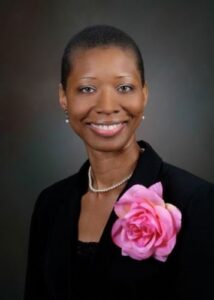This post was written by NCTE member Angela Woodard Walker.
Put everything you’re holding, including your car keys, driver’s license, and teaching materials, in the bin. Take off your shoes, and put them in a bin. Slide your bins through the metal detector. Now slowly walk through the metal detector to sign in, get your photo ID badge from the guard, and relinquish your car keys and driver’s license. These were the Federal Bureau of Prisons’ requirements when I arrived to teach my all-male Composition I students at the medium security Federal Correctional Institution (FCI) in Talladega, Alabama.
I must admit that I was apprehensive about teaching incarcerated students at first. I had to combat frightening Hollywood prison movie scenes in my head. However, I decided to push past the fear to open the door to a new teaching and learning experience. I’m glad I did. After a months-long process of completing an avalanche of mandatory federal forms, a thorough background investigation, digital fingerprinting, and a four-hour orientation training, I was approved to teach the in-person, seven-week course at FCI every Tuesday and Thursday at 6:00 p.m. After the metal detector cleared me each visit, an alert guard wearing a bulletproof vest and sporting a cascade of clanging keys escorted a colleague and me to the Education Building while curious onlookers clad in khaki crisscrossed the compound enclosed by barbed wire fences.
When I arrived at my classroom door, 18 students quietly waited for my entrance (My entrance became increasingly dramatic as I got to know them.). In a boisterous tone, I greeted them from behind my mask. “Hello, y’all! How are y’all doing today? Let’s go! Repeat after me: I AM somebody! I AM intelligent! I AM smart! I AM successful!” I observed that our confession time unified their strong countertenor, tenor, baritone, and bass voices and elevated their spirits and moods every time. Next on the agenda was an engaging team-building activity. Afterward, our high-impact learning environment was set. My ENG 101 students seated in table-topped desks were ready and eager to learn.
In my classroom, a dry-erase board was mounted on the wall, and an overhead projector was sitting on a desk. I had no internet access, computer, laptop, tablet, or any other real technology. (An overhead projector can’t compete with smart classrooms, cellphones, or watches.) I attempted to use the projector a few times but noticed some of my students squinting when I used it (even after maximizing the font size). Instead, I decided to write on the dry-erase board in supersized black letters, or I distributed handouts with an exaggerated font size to everyone to ensure the content was accessible to everyone without singling anyone out. Aside from the textbooks Talladega College’s Second Pell Program provided, I had to take hard copies of everything to the prison, and assignments and quizzes students submitted to me were hand-written hard copies. After I graded their assignments, when I returned to campus, I scanned and uploaded copies of them into our Canvas Learning Management System and returned the originals to the students.
I didn’t view the lack of technology as a challenge. I welcomed the opportunity to think and teach differently. I was Google. I was PowerPoint. I was YouTube. I was the entertainment (I briefly beatboxed at one point.). This wasn’t necessarily a bad thing, just different. My experience showed me how much I depended on technology. Several times at the beginning of the course, I reached for my absent cellphone to Google something. My experience also showed me how I could still be equally, or even more effective, without technology. Honestly, I’d prefer to have access to some technology. However, technology should never replace pedagogy. It can’t. My growth mindset focused on what we had versus what we lacked. I was willing to teach. My students were willing to learn. That was all we needed.
As I continue to reflect on the vibrant and rewarding Spring 2023 experience, it was one of the exclamation points of my decades-long higher education career. The positive life-changing experience shattered my limiting comfort zone. My students bonded with each other and me. I knew them by their names rather than their assigned inmate identification numbers. I respected them. They respected me. We laughed together often. I AM a better professor because of them. I AM a better person because of them. I AM thankful to Talladega College and FCI for the priceless opportunity to teach and encourage them.

Dr. Angela Woodard Walker is an award-winning author and longtime higher education professional. She is the dean of the Division of Humanities and Fine Arts and assistant professor of English at Talladega College, Alabama’s first private historically Black liberal arts college. Her students directly benefit from the several teaching certificates and the Association of Colleges and University Educators’ Effective Teaching Practices certification she has earned. Recently, she completed the 2023 UNCF Teaching + Learning Center Faculty Fellows Program (Cohort 2). She can be reached via email or on LinkedIn.
It is the policy of NCTE in all publications, including the Literacy & NCTE blog, to provide a forum for the open discussion of ideas concerning the content and the teaching of English and the language arts. Publicity accorded to any particular point of view does not imply endorsement by the Executive Committee, the Board of Directors, the staff, or the membership at large, except in announcements of policy, where such endorsement is clearly specified.

